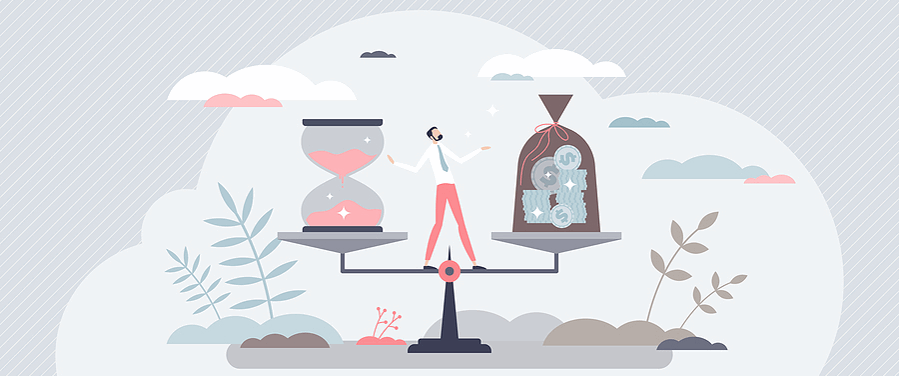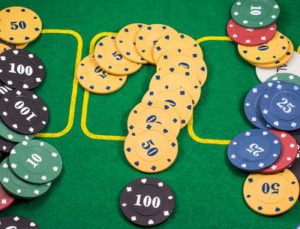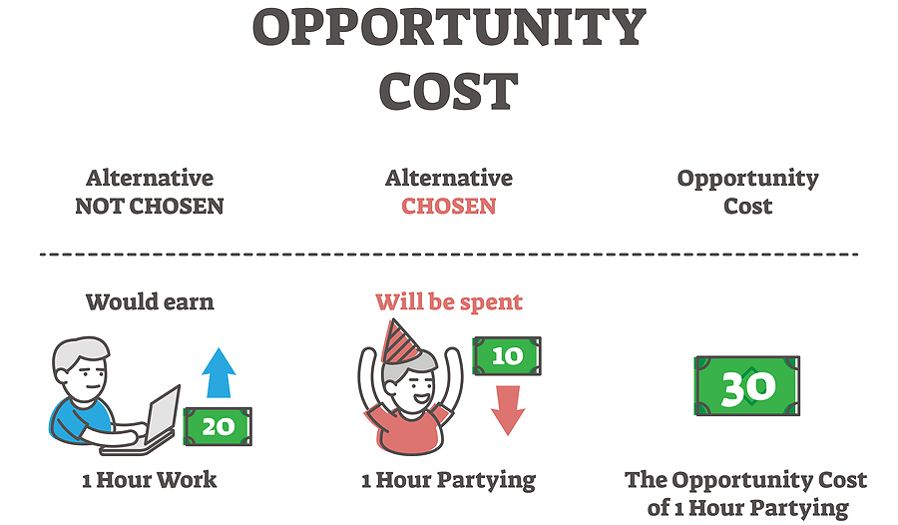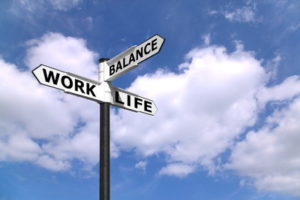 The phrase opportunity cost is something that can be used in all forms of your life. It is certainly something that can be used in poker as part of that and something that a lot of higher-end players think about.
The phrase opportunity cost is something that can be used in all forms of your life. It is certainly something that can be used in poker as part of that and something that a lot of higher-end players think about.
The reason high-end players think about this is not down to the level of their stakes, but it is down to the nature of their play and how often they are sat at a poker table. Even if you are a small player who plays from home, if you play a lot then opportunity cost is probably something you should think about.
What is Opportunity Cost?

Let’s first look at opportunity cost from a very broad angle, what it actually means and how to think of life-based on this. Opportunity cost relates to a benefit that you miss out on when you make one choice over another.
The two choices on offer have to be mutually exclusive in the circumstances, so you are putting something first, and the opportunity cost is what you are missing out on by not choosing the other option.
In life, this could be something as simple as choosing whether to go out or stay in. You have two options, to enjoy a night out, or to stay at home. If you choose to stay in and miss the night out, the opportunity cost is the night out, and what that has cost you.
It doesn’t always have to be associated with money either, it can be about anything. So, in this example, the opportunity cost is likely to be something such as seeing your friends, enjoying a night out, relaxing and forgetting about your troubles and bringing some enjoyment to your life.
This is a very broad look at opportunity cost, and essentially the price of the road you choose not to take. However, you can narrow this down and look at particular elements of your life, and this is what you can do with your poker games. Opportunity cost can be related to a poker game and the choices you make inside that game, which of course determine whether you win or lose.
How Does Opportunity Cost Work in Poker?
 Poker is a game of decisions, and your chances of winning and losing are based upon those decisions and the luck you have with the cards that are dealt. Opportunity cost in poker is not easy to work out and understand, though there are occasions when it is very obvious what the opportunity cost is.
Poker is a game of decisions, and your chances of winning and losing are based upon those decisions and the luck you have with the cards that are dealt. Opportunity cost in poker is not easy to work out and understand, though there are occasions when it is very obvious what the opportunity cost is.
Let’s say, for example, you choose to fold a particular hand in the game. You have two choices, to play or fold, the opportunity cost is playing on. After folding the game will continue without you, and you can see what would have happened to your hand by the cards that are being dealt. If these go in your favour, then you would have won that game.
Although the variances in betting and how other players would have reacted to you being in the game cannot really be worked out, you can clearly see it is opportunity cost working fully, as you can see you would have won that hand.
You can also use opportunity cost for other poker decisions, such as the game you are playing. When you head to your poker site, you can choose your table and this determines the stakes you play. Let’s say you choose to play on a small staking table and have a very good gaming session, where you double your money overall and make a nice profit.
Had you chosen the larger stakes game, that win would have been a lot more, as you would have doubled a larger amount. There are potential differences here, because you may not have played in the same way with more money on the line but making a choice to play the small stakes game has had an impact on your success. The opportunity cost in this instance is profit, you have still made a profit, but a much smaller one given the smaller stakes you have played.
Using Opportunity Cost to Work Out an Hourly Rate

If you are a successful poker player who wins on a regular basis then you really need to work out an hourly rate of your winnings. This is of course an average, but with the hourly rate and opportunity cost combined, you can make much more sense of your finances and the decisions you make.
Let’s use an example here of working out opportunity cost based on your choice to play poker or do jobs around the house.
In this example, you need to paint the walls in your house. The job will take two hours to complete, and you have been quoted 50 for the price of completing the work.
If your poker hourly rate is 20, then in two hours you are going to earn a total of 40. So, if you use the two hours to play poker then you are costing yourself 10, rather than completing the job yourself and it costs nothing.
If your poker hourly rate is 30 then over two hours you are going to make a total of 60, which means it is more profitable for you to pay someone to come and complete the job and pay them 50 to do it. After paying them, you are still left with a profit so, in this instance, the best opportunity cost here is to spend your two hours playing poker and pay the worker to come and complete the job at your house.
This is only something that successful players can do because you need to make money on poker to be in a position to make these kinds of decisions. However, if you are at this stage then it is certainly worth trying to work out.
You could find yourself in a position where you are playing more poker, simply because that is the most cost-effective way to get through the tasks you have, allowing you to play and someone else to do the work.
Opportunity Cost is Not All About Money
 One of the biggest mistakes that many people make is that they look at opportunity cost in poker as being purely about money. This is not the case, and it is vital to understand this when you are looking at things.
One of the biggest mistakes that many people make is that they look at opportunity cost in poker as being purely about money. This is not the case, and it is vital to understand this when you are looking at things.
If you focus on money and nothing else, this can actually be an opportunity cost against you and put you in a worse position than you need to be, because money is the sole focus of your mind. A balanced approach is the best way to look at things, and certainly avoiding everything being about money is a key part of that.
One of the best ways to look at opportunity cost and how it works with a combination of money and lifestyle is looking at the life of a live poker player. These people travel all over the world to play poker, and really enjoy what they do.
These players are successful, so essentially the more time they spend playing poker, the more money they will have. If you are looking at opportunity cost from a pure money point of view, they would choose to stay at home and play from their own home, allowing them to get as many hours of poker into their time as possible. Leaving the house for anything would be a time where they are not making money, but this is not the way to look at things overall, because it is too focused on money.
However, what live poker does bring, and what needs to be focused on here, is the lifestyle and the ability to travel the world and see nice places. This is a balancing act, between having time for playing poker and having time to enjoy your life, if you can get this right, then the opportunity cost of your entire poker career should be very balanced.
There will be people out there who choose to go with the first option and stay at home to dedicate as much time as possible to poker gaming, allowing them to make as much money as possible. However, this is only going to lead to a poor quality of life, missing out on the travel that other players have and potentially suffering from poker fatigue, because they are playing so much.
The key to not doing this is not focusing on money all the time. Look at opportunity cost as a positive when the decision is to fly around the world and visit some great cities. It enriches your life, takes you away from poker slightly, and should give you something you can enjoy for many years because you are getting the right amount of breaks away from the game.
Pro poker player Andy Hills has recently used opportunity cost in this way, to enhance his life and move away from playing at home all the time. He was a former home player but now travels around the world to play live poker. Yes, he takes himself away from a position to earn money sitting at home, but he gives himself the opportunity to see some great places around the world and experience things in life that his poker playing can buy.
Andy has also spoken about player burnout too, and this was a part of his decision making. Rather than sitting at home and playing for many hours, potentially burning out before his career is over, Andy takes the easier life, sees the sights and that will hopefully allow him to have a long and successful poker career.
Conclusion
To round this up, opportunity cost in poker works on values and decisions that you make which turn out to be right or wrong. When working out whether you have made the right decision or not, you need a value but this is often very tough to work out, as really the only value to work out would be an hourly rate, but of course, this is all based on money.
What is key, for all players, is that you don’t simply focus on money, there is far more to this than money. The choice about playing at home or travelling is the perfect example of that, you have to factor your life in, and other benefits that opportunity cost can give you away from financial benefits.
If used in the right way, opportunity cost can give you a great poker life, helping you earn money while also balancing that out with a good life. Used wrong, you may focus too much on money, which could lead to poor decisions, so avoid that, and aim to get the best balance you can find.
